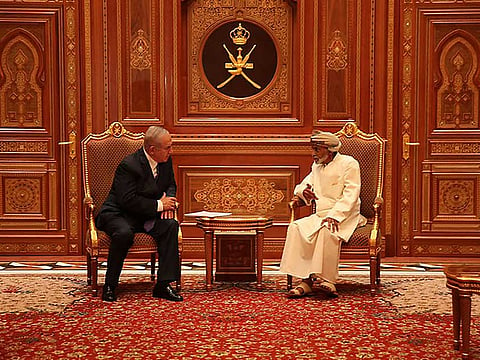A visit wrapped in secrecy and diverse readings
Israel wants to show it is not isolated, and Netanyahu uses visit to Oman for domestic purposes, say analysts

Dubai: Days after the Israeli Prime Minister Benjamin Netanyahu’s visit to Oman, the details of the trip are still unknown and the motives behind it continue to be a matter of speculation.
Arab analysts offered a wide range of interpretations of the visit. Some said the recent events in the region offered “suitable conditions for an Israeli move” towards further normalising ties with some Arab countries while others believed Netanyahu was using the visit to boost his image ahead of possible elections in Israel.
Israeli media hailed the visit saying it “cracked the wall of no public meetings between Arab leaders and Israel’s prime minister”. Palestinians analysts voiced similar views.
“There is an Israeli interest, since the past two years, and this is not new, to publicly normalise relations with the Arab countries,” said George Giacaman, a Palestinian columnist and professor at the West Bank-based University of Beir Zeit.
Netanyahu’s visit gives a new impetus to the normalisation of ties with Arabs in light of the new American strategy for the Middle East, Giacaman told Gulf News. “The idea is to maintain the normalisation momentum.”
Mohammad Al Saeed Idris, an adviser to the Cairo-based Al Ahram Strategic Studies Centre and a columnist said: “It is a time of uncertainty for different parties (in the region), and accordingly it is a perfect time for an Israeli step forward. I also believe Oman was prepared for such a development and it is clear there were communications (before the trip). The visit was not a surprise and it was not a shock,” Idris told Gulf News. Among Netanyahu’s entourage was the Mossad chief, and some Arab analysts said usually intelligence plays a big role in such trips.
Arab analysts said officially it was announced that Netanyahu’s visit came at his own request, but Israeli media said Netanyahu received an invitation.
Unofficially, some explained that there were unconfirmed signs that it was the idea of the Palestinian leader Mahmoud Abbas, who visited Oman a few days earlier. Abbas, according to some analysts, wants the Omanis to arrange a Palestinian-Israeli meeting.
The Palestinians leadership has stopped talking to the Americans, who sponsored all previous talks between Palestinians and the Israelis, after US President Donald Trump relocated the American embassy to occupied Jerusalem last May, in a move that caused outrage among Palestinians.
“I exclude the possibility that the visit came at the request” of the Palestinian leader, said Jordanian professor of International relations Hassan Bararri. “I believe the Omanis are dealing directly with the Americans and the Israelis,” said Bararri, who specialises in the Arab-Israeli conflict, Israeli domestic and foreign policy and regional politics. However, at the same time, Abbas “feels time is ticking, and maybe he needs a new channel” to talk to the Israelis, he added.
Oman’s “Sultan Qaboos may have understood from Abbas there was a chance for renewal of negotiations between Israel and the Palestinians. But it is unlikely that this was the reason Qaboos invited Netanyahu, especially when on the horizon the Trump administration is threatening to announce its deal of the century,” wrote the Israeli newspaper Haaretz.
“If there’s someone who should and can persuade Netanyahu to renew the talks, he’s sitting in the White House,” it said.
Oman has played the role of mediator in many regional issues, including those related to Iran, which has good relations with Muscat. The sultanate is “used as a stop for different countries interested in sending a message to Iran,” said Bararri. This visit is not an exception, he said, adding that he cannot speculate about the message he believes “Israel is interested in sending to Iran”.
Oman also participated in the early stages of the peace process to solve the Arab-Israeli conflict in early 1990s. Muscat hosted the multinational talks on regional water issues, which was one of the five multinational committees of the peace talks between Palestinians and Israelis before they collapsed.
Commenting on Netanyahu’s visit, Omani Minister Responsible for Foreign Affairs Yousuf Bin Alawi told a security summit in Manama on Saturday that his country was not acting as a mediator, but is offering ideas to help Israel and the Palestinians to come together.
Reports quoted Bahrain’s Foreign Minister Khalid Al Khalifa as voicing support for Oman’s role in trying to secure Israeli-Palestinian peace. However, Saudi Arabia’s Foreign Minister Adel Al Jubeir said the kingdom believes the key to normalising relations with Israel was the peace process.
To Giacaman, the “basis for continuing the peace talks with the Israelis doesn’t exist … The Zionist plan was completed in the Palestinian lands occupied in the 1948 war and now there is an ongoing occupation of land in the West Bank. [And] the Palestinian [National] Authority has no plans for the future, as it is believed the two-state solution has ended”.
“I believe the visit won’t lead to any normalisation with the main countries of the region,” said Giacaman. Meanwhile, for domestic reasons, Netanyahu wanted to give the impression to Israelis that the normalisation process is still on track, he said.


![Oman’s Maritime Security Centre confirmed four crew members injured. [Illustrative image. ]](http://media.assettype.com/gulfnews%2F2026-03-01%2Fv5np7wj5%2FOil-tanker.jpg?w=320&auto=format%2Ccompress&fit=max)
